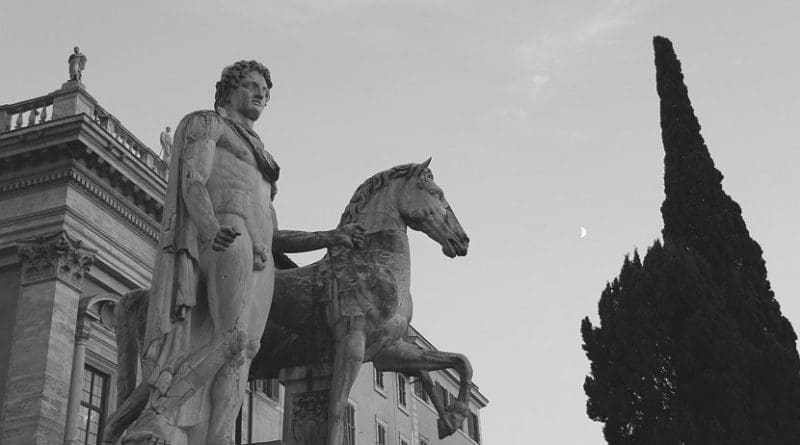Italy: Election Threatens European Calm – OpEd
By Arab News
By Andrew Hammond*
Italian Prime Minister Paolo Gentiloni released the country’s annual security report on Tuesday, highlighting the possibility of foreign online “influence campaigns” ahead of next month’s election. His warning, which appears to have been primarily focused on Russia, adds to the growing concern in Europe about the ballot outcome in the eurozone’s third-largest economy, where there have been more than 60 national governments in the post-war era.
The final crop of polls released last Friday, before the ongoing two-week blackout period began, point to the prospect of no one party or bloc having a working majority in parliament. Should this happen, President Sergio Mattarella may seek to put in place a technocrat or coalition government, or potentially call a new election, which would see center-left Democratic Party (PD) PM Gentiloni — who is currently the nation’s single most popular politician by some margin — stay on in a caretaker role.
The reason why Gentiloni’s warnings are so potentially relevant is not just the presumed tightness of the election result. The polls also indicated that the bloc most likely to emerge in the strongest position is the conservative one led by controversial former prime minister Silvio Berlusconi, who forged a strong working partnership with Russian President Vladimir Putin when in office. Berlusconi, at the ripe age of 81, may be on the verge of an extraordinary return to the political limelight given his 2013 tax fraud conviction, which means that he cannot personally run for office (he has yet to name his preferred candidate for the prime minister’s role should his alliance emerge victorious).
His Forza Italia party is running with two far-right allies, The League and Brothers of Italy, who have collectively averaged just over 35 percent in recent polls. This is despite the inherent disputes within this group, with The League’s Matteo Salvini asserting that he wishes to leave the EU and eurozone, while Berlusconi is more pro-Brussels.
Salvini, like Berlusconi, is positive toward Putin and has made several high-profile trips to Russia. This includes a March 2017 visit to sign a cooperation agreement with the ruling United Russia party.
While Berlusconi’s alliance therefore appears in the strongest electoral position for March 4, the most popular single party is actually the populist Five Star Movement. It scored just below 30 percent in recent polls but has ruled out forming any alliances, which probably means it will not win power this time around. Like Salvini’s party, Five Star has sought a re-evaluation of Italy’s relationship with Russia. This includes calling for the lifting of EU sanctions against Moscow.
Polls since December have shown no major shift in Italian voting intentions, indicating the election outcome remains in the balance. Two further big reasons for uncertainty are that more than a third of Italy’s 50 million voters remain undecided about which way to cast their ballot; and secondly the introduction of a new, untested voting system that is two-thirds proportional representation and one-third first-past-the-post, making it harder for any single party to win power.
Under the new system, the next Italian government will need to have secured around 40 percent of the vote to win a working majority. This is a tall order given the significant fragmentation of the country’s political landscape: Hence why a German-style grand coalition cannot be ruled out between one or more right-of-center party and the center-left PD (currently polling at less than 25 percent), which is being led in the election campaign by previous prime minister Matteo Renzi, who resigned in December 2016 after losing a constitutional referendum.
The potential post-election political paralysis is causing growing concern across other European capitals because Italy has been seen as the biggest threat to the eurozone’s future. It has the second-biggest debt load in the single currency area at more than 130 percent of GDP, and its banking sector is under significant stress, with massive under-performing loans representing an estimated 135 percent of GDP.
There remains significant public angst over corruption, the nation’s migration crisis, and continuing fragility in the economy, with double-digit unemployment and low growth. Indeed, GDP per head is now less than in 1997 at constant prices: Only Greece has fared worse in the eurozone during this period, which has fueled the success of anti-establishment parties like Five Star.
The latter, which was founded around a decade ago by former comic Beppe Grillo, is now led by 31-year-old Luigi Di Maio. Five Star has already won mayoral elections in key cities like Rome and Turin. In the past, it has asserted the country should reconsider its role in the EU, and called for a referendum on whether it should keep the single currency.
In this troubled political context, even a grand coalition could be weak and unstable. If this happens, many voters may rue the decision to vote down Renzi’s constitutional reform plans from 2016, which he hoped would usher in greater political stability. His argument then was that more stable majorities in the legislature, and the stronger governments this would have facilitated, would enable the reforms needed to enhance economic growth and reduce the public debt. However, opponents of the reforms, including ex-technocrat prime minister Mario Monti, asserted they would have given the executive excessive power and made government less accountable.
Taken overall, the Italian vote will see no single party have a working majority, but polls indicate Berlusconi’s bloc could collectively win more than the 40 percent required. Even if that proves the case, or a broader grand coalition is forged, the second half of 2018 could bring renewed political and economic uncertainty in Italy, given that any new administration may be weak, unstable and incapable of securing the structural reforms that the country badly needs.
*Andrew Hammond is an Associate at LSE IDEAS at the London School of Economics.

